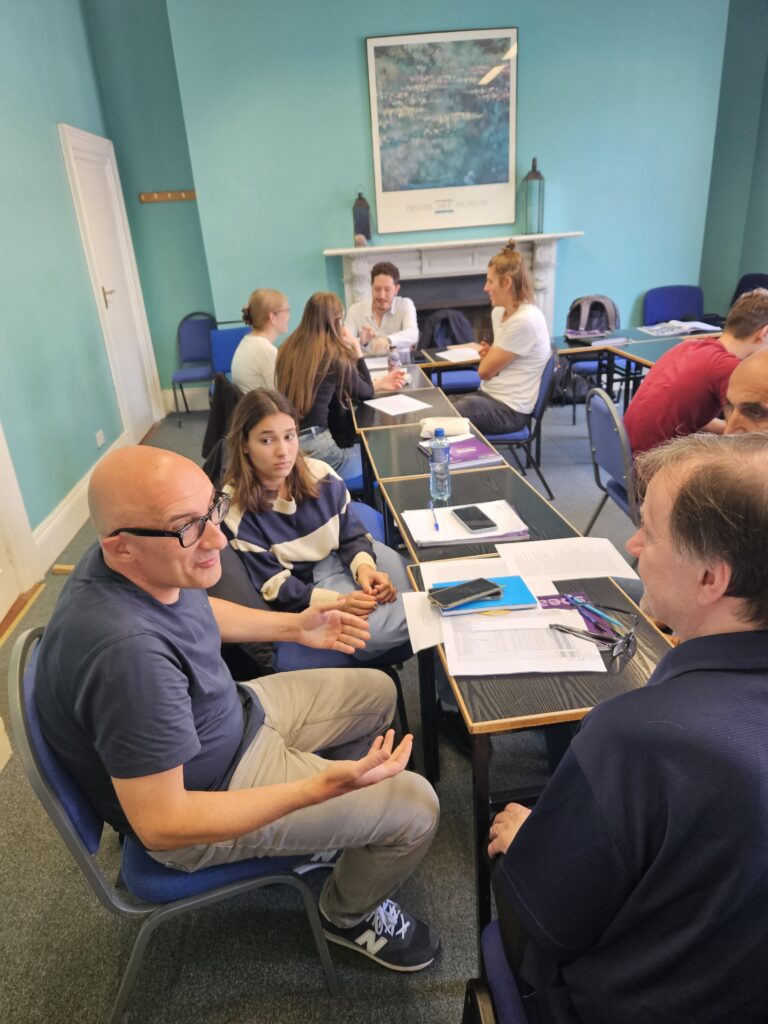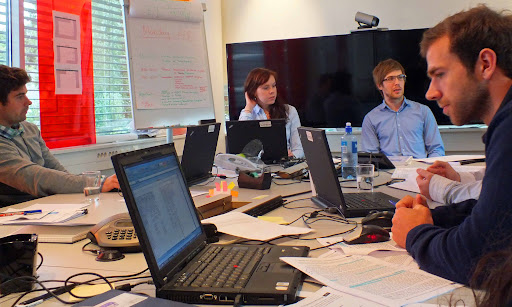The Future of CPD in European Higher Education: Adaptive Learning and Competency in English
Higher education in Europe is standing at a crossroads. As artificial intelligence (AI), adaptive learning technologies, and globalisation reshape how we teach, research, and collaborate, the professional development of academic staff has never been more important. Traditional CPD models — the occasional workshop or one-size-fits-all training — are no longer enough. Universities now need dynamic, ongoing, and adaptive staff development that prepares faculty for both digital transformation and internationalisation.

One crucial aspect of this international shift is English language proficiency. Across Europe, a growing number of university courses are being delivered in English, reflecting its role as the global language of academia. Professors and lecturers must not only adapt to new digital tools but also teach, publish, and collaborate confidently in English to stay connected in a global higher education landscape.
This is where AI, adaptive learning, and targeted language training come together. Together, they offer the tools to transform Continuous Professional Development (CPD) from a static requirement into an innovative, personalised, and future-focused journey for educators across Europe.
Why CPD Needs to Evolve
For decades, professional development in universities has followed a fairly standard pattern: scheduled workshops, occasional conferences, or once-off training events delivered in a lecture-style format. While these opportunities can be useful, they often operate at a generic level and fail to reflect the varied teaching contexts or evolving responsibilities of academic staff. Once the workshop ends, there is usually little follow-up or structured support to help participants apply their new knowledge in practice, which means much of the potential impact is lost.

At the same time, the profile of students entering higher education has changed dramatically. Today’s learners are digital natives, accustomed to navigating multiple platforms, apps, and tools in their everyday lives. They arrive in lecture halls with digital-first expectations: they want learning experiences that integrate technology meaningfully, from blended classrooms to interactive online assessments. They also expect their professors to be critical users of technology, able to discuss its risks, ethical implications, and impact on society and not just be instructors who know how to operate a platform.
This creates a gap between what many traditional CPD models provide and what modern students (and European policy) demand. To meet these expectations, and to align with Erasmus+ priorities on digital transformation, inclusion, and innovation, staff mobility and CPD must evolve. The European Education Area (EEA) (https://education.ec.europa.eu/education-levels/higher-education/eea-in-higher-education) calls for higher education systems that are more digital, resilient, and globally connected, while the Digital Education Action Plan 2021–2027 (https://education.ec.europa.eu/education-levels/higher-education/digital-education-action-plan) highlights the need to improve digital literacy and empower educators to integrate technology into their teaching in meaningful ways.
Universities that continue to rely solely on outdated models of training risk falling behind. They may struggle to prepare graduates for the future workplace, where digital fluency, creativity, and critical thinking are essential. They may also lose ground in the global education market, as international students increasingly choose institutions that can demonstrate modern, digitally equipped learning environments and staff who are confident using (and questioning) technology in their teaching.
Adaptive Learning: A Game Changer for Faculty Development
Adaptive learning uses data and AI-driven tools to tailor learning experiences to each individual. Rather than moving every participant through the same material at the same pace, adaptive platforms adjust content, difficulty, and feedback according to a learner’s progress.
For university staff, this means:
- Personalised training pathways: Instead of sitting through hours of material that may or may not be relevant, adaptive learning platforms build a pathway unique to each staff member. For example, a language lecturer may focus on digital tools for assessment, while a STEM professor may need guidance on visualisation tools and coding. This reduces wasted time and ensures CPD feels directly applicable.
- Real-time insights: Adaptive systems provide immediate feedback to both learners and institutions. For staff, this means knowing exactly where they are excelling and where they need to focus more energy. For coordinators, it provides a clear view of progress across a team or faculty, helping to design targeted training interventions.
- Ongoing engagement: Unlike traditional workshops that end after a single day, adaptive learning platforms encourage continued practice and feedback. University staff can dip in and out of content, allowing CPD to become part of their regular professional routine rather than an isolated event. This fosters long-term skill development that actually sticks.
Just as universities increasingly use adaptive tools to support students, it makes sense to apply the same principles to staff training, ensuring that every educator gets what they need to thrive.
Strategic Benefits for Universities
Artificial intelligence is no longer a future possibility; it is already embedded in academic life. From automated grading systems and plagiarism checkers to AI-assisted research tools, universities are discovering that AI can take over routine, time-consuming tasks, freeing staff to focus on teaching and innovation.

For higher education institutions, integrating AI and adaptive learning into CPD is not only about supporting individual staff, it’s a strategic investment in institutional excellence and competitiveness. By embedding digital transformation into professional development, universities gain multiple long-term benefits:
- Attracting international students: Globally mobile learners increasingly look for universities with a reputation for innovation, modern teaching practices, and digital-savvy staff. Institutions that demonstrate strength in AI and adaptive learning are more likely to attract Erasmus+ exchange students and fee-paying internationals who value cutting-edge education. This strengthens both the reputation and revenue of the organisation.
- Preparing graduates for the future workplace: Employers now prioritise digital skills, adaptability, and critical thinking over traditional credentials alone. Universities that provide their staff with CPD in AI and adaptive learning ensure that graduates are equipped with the competences demanded by Europe’s evolving labour market, particularly in technology, health, and green industries.
- Aligning with Erasmus+ priorities: The Erasmus+ Programme Guide 2023 makes clear that digital transformation, inclusion and diversity, sustainability, and active citizenship are the four key priorities for 2021–2027 (see: https://erasmus-plus.ec.europa.eu/programme-guide/erasmus-programme-guide). By investing in CPD that addresses these areas, universities align themselves directly with EU strategies, strengthening applications for funding and reinforcing their relevance within the European Higher Education Area.
- Maximising Erasmus+ KA1 Staff Mobility: Key Action 1 (KA1) supports the mobility of higher education staff to gain new competences, improve teaching quality, and build international networks (see: https://erasmus-plus.ec.europa.eu/opportunities/opportunities-for-individuals/staff/teaching-mobility-of-higher-education-staff). By using KA1 funding to send faculty to accredited Erasmus+ training centres, universities can upskill staff in digital and adaptive learning while ensuring compliance with Erasmus+ reporting and quality assurance requirements.
The Importance of English Language Proficiency for University Staff
As Europe’s universities become increasingly international, English is emerging as the primary language of teaching, research, and collaboration. A growing number of degree programmes across disciplines – from engineering to economics – are now delivered in English to attract international students and to prepare graduates for the global labour market.
For academic staff, this shift brings both opportunities and challenges. Professors, lecturers, and administrators must be able to:
- Teach and communicate effectively in English, even when their primary expertise lies in another language or discipline.
- Participate in international research networks, conferences, and project collaborations, where English is the common working language.
- Support diverse student populations, including Erasmus+ mobility students and full-degree international students who rely on English as the medium of instruction.
The European Commission has long recognised the role of English proficiency in higher education internationalisation. In its vision for the European Education Area (https://education.ec.europa.eu/education-levels/higher-education/eea-in-higher-education), it highlights the importance of multilingual and intercultural competences for both staff and students, with English proficiency playing a central role.
Without strong English skills among faculty, universities may struggle to remain competitive in attracting international students, participating in global research consortia, or delivering courses that meet international accreditation standards.
That’s why investing in English language CPD for staff is not a luxury, it’s a strategic necessity! Erasmus+ mobility programmes provide the perfect framework for supporting this development, enabling universities to strengthen both their teaching quality and their international profile.
How Erasmus Courses Ireland Can Help
At Erasmus Courses Ireland, our course portfolio is designed to meet the evolving needs of higher education professionals. While English language development is at the core of many of our offerings, we also provide methodology, culture, and digital education courses that help academic staff enhance their teaching, leadership, and professional communication. All courses are eligible under Erasmus+ KA1 Staff Mobility funding.
Digital transformation: Our courses for Teaching 21st Century Skills in the Digital Age equip participants with practical AI skills, digital literacy, and strategies for integrating adaptive learning into their teaching and research. Faculty staff leave with both the confidence and the tools to lead digital change in their institutions.

Find more about our courses, training centres and dates here:
We support coordinators and faculty at every stage of the Erasmus+ journey: from guidance on paperwork and funding applications, to on-site orientation and cultural activities, through to certification and post-course networking. Participants return home not only with enhanced digital competences but also with renewed confidence, European networks, and practical strategies ready to apply.
Conclusion: A Vision for the Future
The future of CPD in European higher education is personalised, adaptive, and globally connected. By embracing AI and adaptive learning, universities can prepare their staff (and their students) for the challenges and opportunities of a rapidly changing world. But digital innovation alone is not enough. Without strong English language competency, universities risk being left behind in the race to attract international students, deliver English-medium instruction, and participate in cross-border research.
That’s why Erasmus+ staff mobility, and programmes like those offered by Erasmus Courses Ireland, are so powerful. They provide staff with a unique opportunity to develop English proficiency alongside digital skills, intercultural competence, and modern teaching methodologies. Our accredited centres in Dublin, Cork, and Galway combine expert-led training with Ireland’s rich cultural environment, ensuring that participants leave with not just improved skills but also the confidence to apply them in international contexts.
For universities, the message is clear: investing in English language CPD, alongside digital and adaptive learning, is a strategic necessity. It ensures competitiveness, enhances reputation, and prepares institutions to thrive in the European Education Area.
